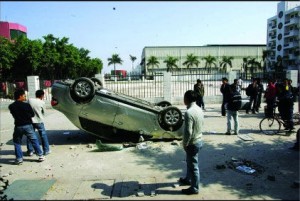
Maersk accused of repression of workers in China Danish transport giant under fire for tough company rules and poor conditions at container factory in China
Peter Rasmussen, Denmark
Strike is forbidden.
"Go slow" is forbidden. It is forbidden to hide from management, if one suffers from a sexual transmitted disease. These are three of the rules for workers at the Danish-owned Maersk Container factory near Dongguan in Southern China. The factory is being accused of harsh regulations, dangerous working conditions and corruption, reports Danish newspaper, Politiken and Danish national television.
(This is a summary of two articles : Maersk accused of repression of workers in China and Danish transport giant under fire for tough company rules and poorconditions at container factory in China. Published in 10 January 2009.)
The rules mentioned above are three out of 73 regulations in the company's "employee handbook". Breaking the rules is sanctioned with "dismissal first time," according to the handbook. Other rules are more detailed: Workers who fail to clean their plates or stand properly in line in the canteen are punished with demerit points or dismissal, the manual states. The factory experienced by two major strikes in 2008. In January workers committed a riot at the plant, crashing offices and cars, after security guards had been beating up a migrant worker who broke canteen regulations. In May 2008 29 workers were fired for participating in another strike.
An atmosphere of fear
The Hong Kong-based NGO, Globalization Monitor, has been following the conditions at the factory over time. In a report published January 12, Globalization Monitor criticises the general conditions for the workers. The organisation reports that several workers complaint about corrupt supervisors, who punish critical workers with sanctions or dismissal. Workers also complain about hearing damage and lung problems caused by dangerous working conditions, Globalisation Monitor reprots. "The conditions for the workers are very extreme, and the company's harsh rules are creating an atmosphere of fear among the employees. The rules, set up by Maersk, are in many occassions tougher than at similar Chinese factories. They are violating Chinese law and international conventions under the UN and the ILO. The purpose is obvious: to terrorize the employees after they twice rebelled against the brutality of the management," researcher Au Loong-Yu said. Workers, interviewed by the newspaper Politiken, especially critizise the Chinese supervisors role: "Many workers, who have spoken out against the conditions, have been fired or harrassed. The Chinese supervisors at the factory actively uses the company rules against us. If I criticise the conditions in front of my manager, there is a great risk that he will take revenge and punish me," one worker said. He wishes to remain anonymous, due to fear of retaliation. Another worker, 33-year old Wang Dapeng says that he suffers from hearing damage because of working in the welding section at the factory. Due to the injury, his work time was reduced from 60 to 40 hours. His wages were at the same time reduced to 800 RMB (117 USD) monthly. "I told the supervisor that I wanted to discuss my wages with a manager. The day after they told me, that I was fired," Wang Dapeng said.
Conditions can cause cancer and lung problems
A number of workers say that they suffer from occupational illnesses caused by polluted air, loud noise and lack of protection. Danish doctor in occupational medicine, Erik Jørs, has studied photos and video from the factory, recorded by the workers on cell phones. He agrees that the conditions are dangerous to the workers: "Workers operate in areas with fumes from welding without proper extraction of air. A certain percentage of the workers is going to develop chronic bronchitis and suffer from reduced lung capacity. In the end it can cause lung cancer, Erik Jørs said. Maersk Container Industry is fully owned by A.P. Moller-Maersk, one of the world leading transport companies. The Donguan factory opened in 2006 and employs about 1,800 migrant workers. Irving Hultengren, Managing director of the factory in Dongguan denies the allegations of corruption, poor working conditions or harrashment of critical workers. "The employees' conditions by far extend what workers on countless other factories in the area are being offered. Any employee can freely critizise conditions or come up with suggestions through their union," Hultengren said. He sees no problem in the company's ban on strikes and go-slows: " Maersk Container Industry's employee handbook emphsizes to the workers, that according to Chinese law practice, strike is illegal."
However, this is not correct, according to Anita Chan, researcher in Chinese labour at the Department of Asian Studies on the Australian National University. She said about the company rules: "This is not in accordance to any Chinese laws related to labor. In the Chinese legal system "strikes" are neither legal nor illegal. If so, for a workplace to say there should be no strikes does not have legal backing, " Anita Chan said. Because of this, strikes and work stoppages in some occasions are tolerated and considered legal, by Chinese authorities. A.P. Moller-Maersk has asked the British company, Impactt Limited, to investigate the conditions at the plant through an audit, when workers return from Chinese New Year in March 2009. Maersk has announced that the workers are receiving two months of paid vacation, as the factory is closing down for this period due to the economic crisis.
Danish links: Politiken http://politiken.dk/erhverv/article627185.ece
DR TV: http://www.dr.dk/DR1/soendag/Udsendelser/2008/11.+januar+2009.htm http://www.dr.dk/DR1/soendag/
